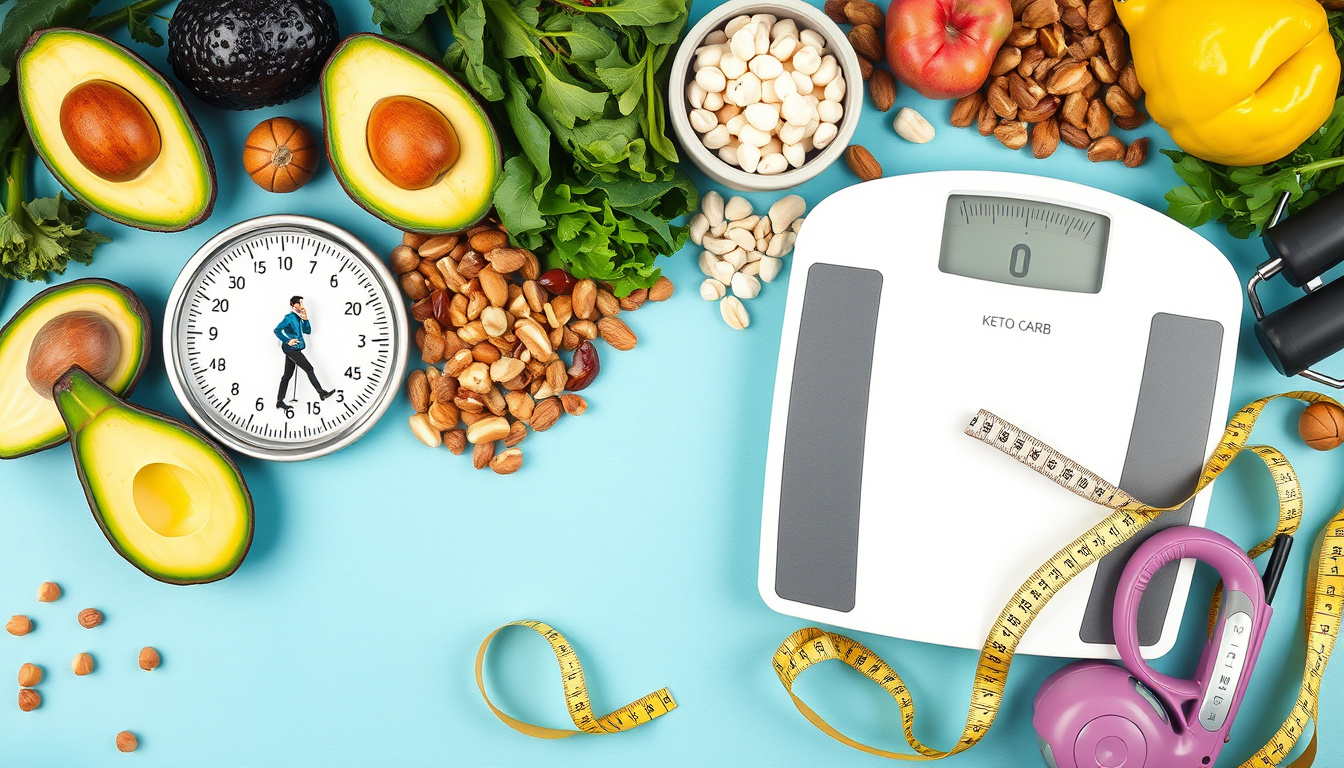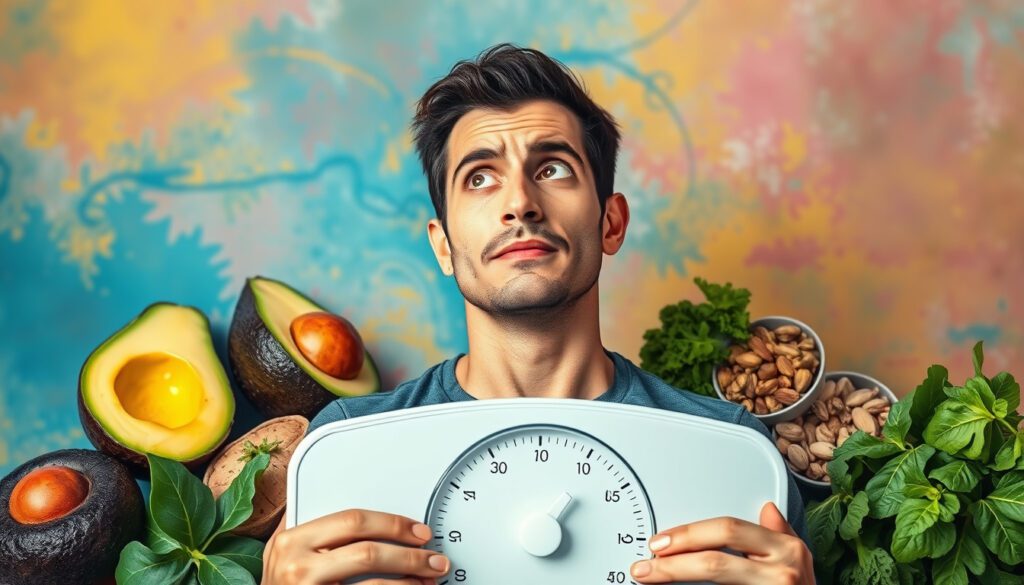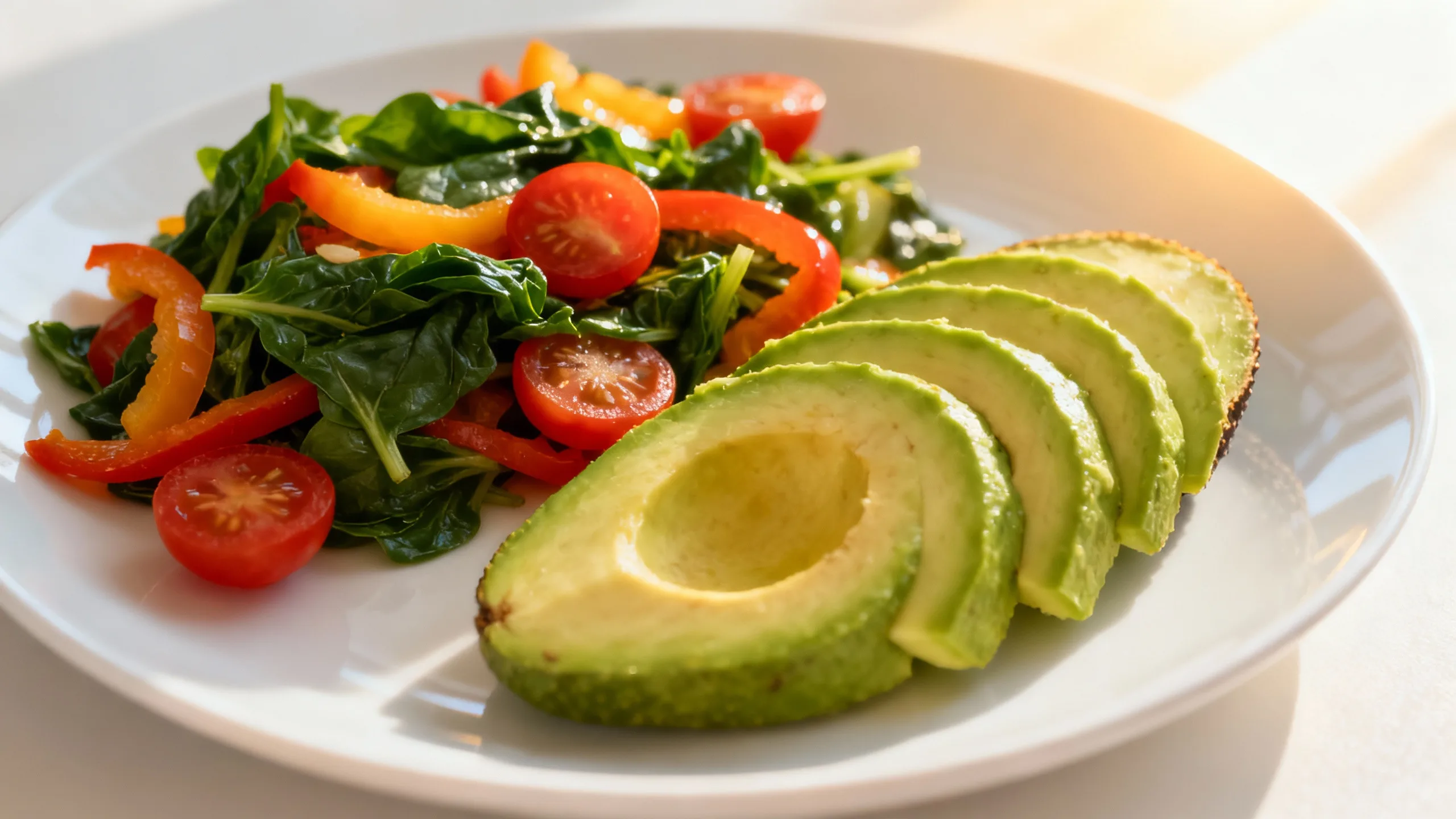
The ketogenic diet, often referred to as keto, has gained immense popularity as an effective weight loss strategy. However, many individuals find themselves in a frustrating situation where they are on keto and not losing weight.
Download your FREE Macros Tracker Sheet here

If you’ve committed to this low-carb lifestyle and still see the same numbers on the scale…
you’re not alone.
In this article, we dive into the basics of the keto diet, explore common reasons for weight loss plateaus, and provide essential tips to help you overcome these obstacles and make the most of your keto journey.
TL;DR
- Understanding the ketogenic diet is crucial for effective weight loss.
- Plateaus on a keto diet can result from various physiological and lifestyle factors.
- Monitoring macros and caloric intake is essential for maintaining a calorie deficit on keto.
- Psychological barriers can hinder weight loss progress and should be addressed.
- Implementing specific strategies can help optimize your keto diet for better results.
Understanding Keto Diet Basics
For many individuals embarking on their weight loss journey, the ketogenic diet presents an effective approach by emphasizing high-fat, moderate-protein, and low-carbohydrate intake. However, some may find themselves wondering, ‘Why am I on keto and not losing weight?’ This common concern can arise from several factors, including insufficient calorie deficit, hidden carbs in food choices, or hormonal imbalances affecting metabolism.
- It’s crucial for those experiencing weight loss plateaus to carefully track their macronutrient ratios and overall caloric intake.
- Additionally, stress and lack of sleep can hinder weight loss progress, even for those strictly adhering to keto guidelines.
Understanding these potential challenges can help individuals better navigate their journey and effectively adjust their dietary plan for optimal results.
Common Reasons for Being on Keto and Not Losing Weight
When you first embark on a ketogenic diet, the initial phases often lead to impressive weight loss. That first week’s loss, however, is liable to be “water-weight.” A good goal for loss is 2 lbs./week–after that first week.
Still, many individuals experience a frustrating weight loss plateau at some point, prompting them to wonder, ‘Why am I on keto and not losing weight?’ Understanding the common reasons for this can help you break through the plateau and get back on track.
One primary reason is the body’s adjustment to a lower carbohydrate intake. When you reduce carbs, your body shifts from using glucose as its main energy source to burning fat, a process called ketosis. This metabolic transition can temporarily slow down weight loss as your system recalibrates, often leading to a plateau before fat loss picks up again.
Also, hidden carbohydrates in some foods might kick you out of ketosis without you realizing it. Eating too much protein will have the same effect. Hormonal fluctuations, particularly cortisol spikes due to stress, can also hinder fat loss.
Sometimes, what feels like a weight loss plateau is actually caused by eating more than you realize. You might be taking in too many calories without noticing, or thinking you can eat more and still stay in ketosis. Even if you’re following a low-carb diet, eating too much can still slow or stop your progress.
By identifying these factors, you can make necessary adjustments to your diet and lifestyle, helping you continue your weight loss journey effectively.
‘The greatest wealth is health.’ – Virgil
Download your FREE Macros Tracker Sheet here
Common Reasons
- Body adjusting to lower carbohydrate intake
- Switch from glucose to fat for fuel (ketosis)
- Temporary slowdown during metabolic transition
- Hidden carbohydrates knocking you out of ketosis
- Excess protein disrupting ketosis
- Hormonal fluctuations affecting fat loss
- Unnoticed overeating as a plateau cause
- Overestimating how much you can eat and stay in ketosis
- Overeating hindering progress despite low-carb intake

The Role of Macros and Caloric Intake
When following a ketogenic diet, understanding the role of macros and caloric intake is crucial for those who find themselves on keto and not losing weight.
While keto emphasizes high fat, moderate protein, and very low carbohydrate intake, it’s essential to maintain an appropriate balance of these macronutrients to achieve optimal ketosis. Caloric intake plays a significant role as well; consuming too many calories, even from keto-friendly sources, can hinder weight loss progress.
So, individuals who are on keto and not losing weight, must carefully track their macros and total caloric intake, focusing on nutrient-dense foods that enhance satiety while keeping the caloric count in check. One must also ensure that fat intake is high enough to facilitate the body’s reliance on fat for energy, but if the overall caloric surplus persists, weight loss may stall.
By fine-tuning both your macro ratios and caloric consumption, you can break through weight loss plateaus and effectively manage your keto journey. The Savvy Keto Macros Calculator will help you determine your levels. And be sure to download the FREE Macros Tracker pdf for your personal use: SavvyKeto Macros Tracking Sheet
Psychological Factors Impacting Weight Loss
Being on keto and not losing weight can be incredibly frustrating, especially when you feel like you’re doing everything right. Often, the issue isn’t just physical—it’s psychological:
- Strict food restrictions can lead to feelings of deprivation, which may trigger cravings for high-carb foods. The stress of following a rigid diet can also cause anxiety, making it harder to stay motivated and focused.
- Emotional eating is another common obstacle. When life gets tough, some people turn to food for comfort, even if it doesn’t fit their keto plan.
These mental and emotional patterns can quietly sabotage progress. Recognizing them is the first step toward change.
A more mindful approach—one that considers your relationship with food and how emotions influence your eating—can help break through the plateau and get weight loss back on track while staying keto.

Tips to Optimize Your Keto Journey
If you’re on keto and not losing weight, it’s time to take a closer look at what might be holding you back. Even with a solid low-carb plan, small missteps can stall your progress. Here are some ways to get back on track:
- Track your macros carefully. Hidden carbs can sneak into your meals and disrupt ketosis without you realizing it. Double-check labels and portion sizes.
- Choose whole foods over processed “keto” products. Packaged keto snacks often contain ingredients that can spike your carbs more than expected.
- Watch your portions. Eating too much—even of keto-approved foods—can prevent weight loss or even cause gain.
- Stay hydrated and balance your electrolytes. Dehydration and imbalanced minerals can make you feel sluggish and slow your metabolism.
- Move more. Adding regular exercise boosts fat burning and supports overall metabolic health.
- Be patient. Your body needs time to adjust to ketosis. Water retention, hormonal shifts, and metabolic changes can temporarily hide your progress.
When you’re on keto and not losing weight, these small adjustments can make a big difference.
Frequently Asked Questions
What is the keto diet, and how does it work for weight loss?
The keto diet is a high-fat, low-carbohydrate eating plan that aims to put your body into a state of ketosis, where it burns fat for energy instead of carbohydrates.
This shift can lead to weight loss as your body utilizes stored fat.
Why might I be on keto and not losing weight?
Several factors can contribute to weight loss plateaus on keto, including excessive calorie intake, not reaching ketosis, hormonal imbalances, or not tracking macros properly.
How can I optimize my macros for better weight loss results on keto?
To optimize your macros on keto, aim for a ratio of approximately 70-75% fat, 20-25% protein, and 5-10% carbohydrates.
Additionally, track your intake using food logging apps to ensure you’re sticking to your targets.
What psychological factors could be affecting my weight loss on keto?
Psychological factors like stress, emotional eating, or unrealistic expectations can negatively impact your weight loss progress.
It’s important to address these issues through mindful eating practices and possibly incorporating stress management techniques.
What tips can help me break through a weight loss plateau while on keto?
To break through a weight loss plateau, consider strategies such as adjusting your calorie intake, varying your workout routine, ensuring you’re properly hydrated, and re-evaluating your food choices to eliminate hidden carbs.
As an Amazon Affiliate, Savvy Keto makes a commission (at no extra cost to you) on purchases you make thru links on this site.




